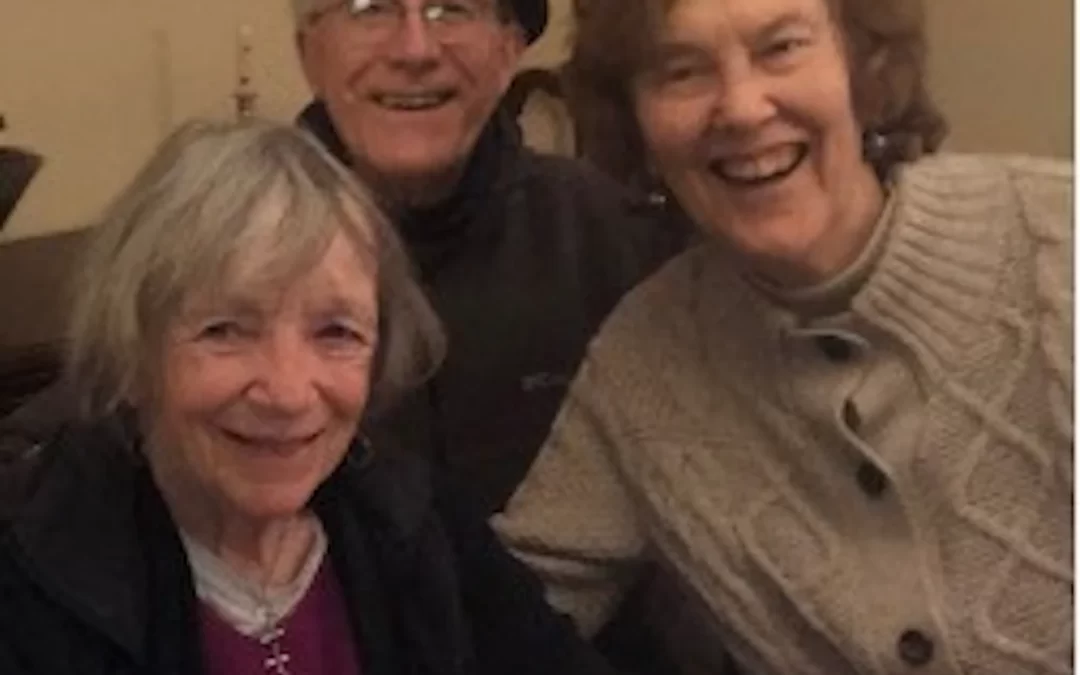VOICES IN TRADITIONAL AND INDIGENOUS RELIGIOUS TRADITIONS
Foundational Nature-grounded understandings of the religious naturalist orientation are to be found in all indigenous and traditional Asian and Western religions. A key website along this axis is called Yale Forum on Religion and Ecology, a project overseen by the splendid couple Mary Evelyn Tucker and John Grim (pictured here with Ursula Goodenough), which offers insights and links to the rapidly emerging world of what they call religious environmentalism in numerous faith communities. An extensive presentation of these perspectives is found in Indigenous Traditions and Ecology: The Interbeing of Cosmology and Community and in Sacred Nature: Restoring Our Ancient Bond with the Natural World.
Lifted up below are a few of many such voices to sing along with Pope Francis:
Remember, remember the circle of the sky
the stars and the brown eagle
the supernatural winds
breathing night and day
from the four directions.
Remember, remember the great life of the sun
breathing on the earth
it lies upon the earth
to bring out life upon the earth
life covering the earth.
Remember, remember the sacredness of things
running streams and dwellings
the young within the nest
a heart for sacred fire
the holy flame of fire.
— Prayer of the Pawnee/Osage/Omaha
[Sustainable practice] can be done only if all of us … can again see ourselves as part of the earth, not as an enemy from the outside who tries to impose its will on it. Because we … know that, being a living part of the earth, we cannot harm any part of her without hurting ourselves.
— Lame Deer/Lakota
I do not see a delegation for the four-footed. I see no seat for the eagles. We forget and we consider ourselves superior, we are after all a mere part of the Creation. And we must continue to understand where we are. And we stand between the mountain and the ant, somewhere and there only, as part and parcel of the Creation. It is our responsibility, since we have been given the minds to take care of these things.
— Oren Lyons, Faithkeeper of the Onondaga Nation
The mountains, I become part of it…
The herbs, the fir tree, I become part of it.
The morning mists, the clouds, the gathering waters,
I become part of it.
The wilderness, the dew drops, the pollen
I become part of it.
– –Navajo chant
Even as a mother protects with her life
Her child, her only child,
So with a boundless heart
Should one cherish all living beings,
Radiating kindness over the entire world,
Spreading upward to the skies,
And downward to the depths,
Outward and unbounded.
— Metta Sutta, Buddhism
Heaven is my father and earth is my mother
And even such a small creature as I finds an intimate place in their midst.
Therefore, that which extends throughout the universe
I regard as my body and that which directs the universe I consider as my nature.
All people are my brothers and sisters, and all things are my companions.
— Chang Tsai, Confucianism
The Word is living, being, spirit, all verdant greening, all creativity. This Word manifests itself in every creature.
— Hildegard of Bingen (1098-1179), Christianity
Christians are called to accept the world as a sacrament of communion, as a way of sharing with God and our neighbors on a global scale. It is our humble conviction that the divine and the human meet in the slightest detail in the seamless garment of God’s creation, in the last speck of dust of our planet.
Ecumenical Patriarch Bartholomew, Greek Orthodox
And here’s how I frame this parameter in my forthcoming book, The Sacred Depths of Nature 2e:
Importantly, if I find that I am joined in a river cleanup project by people who are so engaged because the river is the Lord’s or Allah’s Creation, or because the river is inhabited by Spirits, that’s fantastic. My perspectives as a religious naturalist and the perspectives of those holding traditional religious beliefs have arrived at the same place: an imperative that the planetary matrix and its creatures be respected and cherished and, when necessary, remediated. As our group gathers up the plastic bags and soda cans and sops up the oil slicks and removes invasive growth, all of us are engaging our religious sensibilities in doing what needs to be done. We share a common purpose — I would say a common Purpose. And as the afternoon progresses, some of us become good friends.
